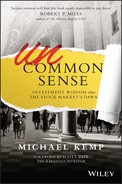APPENDIX A:
WHY BOOK VALUE DIFFERS FROM ECONOMIC VALUE
Here are some of the reasons why book value differs from economic value:
- Plant and equipment are recorded at their purchase price less an allowance for depreciation. Inflation and technological advances often render this a poor measure of current market value. Book value typically understates the new replacement cost of plant and equipment for a going concern and overstates the sale price in the event of liquidation.
- Assets are depreciated at rates set by accounting standards. These rates often differ from economic reality.
- Real estate, when carried at historical cost, can fall well short of its market value over time. The significant write-downs undertaken by real estate investment trusts (REITs) in the wake of the subprime crisis and the GFC illustrate the potential for significant overvaluations to occur as well.
- The value of intangible assets, such as goodwill, are often misrepresented in the accounts. Goodwill can be internally generated through years of good customer service and product reliability (in the case of industrial companies that produce consumer and commercial products). That same goodwill can be acquired when one company buys another. Accounting standards require that goodwill is treated differently under each circumstance. Internally generated goodwill is not recorded in the accounts, while purchased goodwill is recorded as an asset by the acquirer. What's recorded is the amount by which the acquisition price exceeds the book value of the acquired company. Consider Coca-Cola (US), which possesses one of the most valuable brand names in the world. Accounting standards require that Coca-Cola doesn't recognise this internally generated goodwill in its books. But if Coca-Cola was acquired, the acquirer would record the goodwill as an asset, which in this case could well be in the order of $100 billion. It is exactly the same asset, but a different value is given to it depending on who owns it.
- For many companies, particularly those in service industries, human capital — the quality, skill and knowledge of the workforce (including management) — is of significant value. This is not reflected on the balance sheet.
..................Content has been hidden....................
You can't read the all page of ebook, please click here login for view all page.
